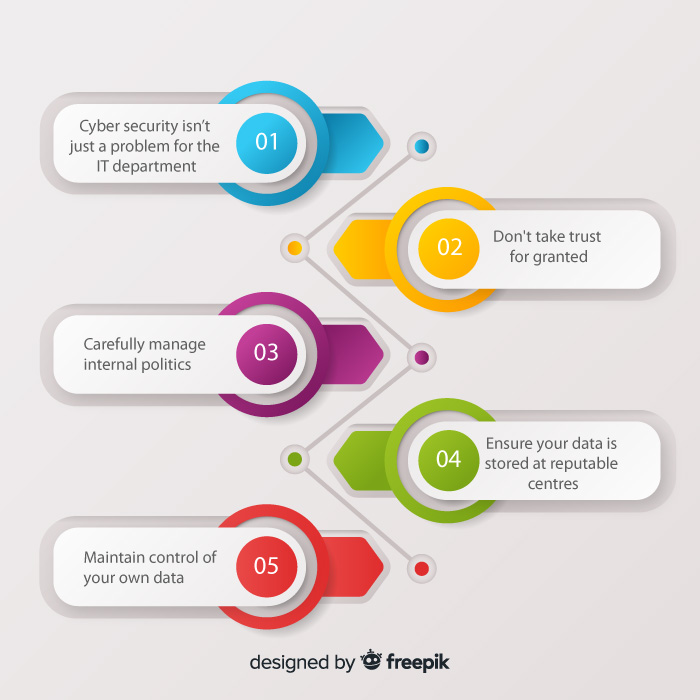Cloud has become the natural progression for organisations. There aren’t many compelling reasons why you would choose to have your business systems live anywhere else. If your finance systems are up for review, it’s worth reviewing our 5 need-to-know cloud security facts.

5 need-to-know cloud security facts when choosing your finance solution
1. Cyber security isn’t just a problem for the IT department
Cybercrime costs $600 billion globally and is increasing. Although it is the CTOs and IT heads that are in the spotlight when cyber-attacks happen, every user is capable of exposing a system’s vulnerabilities. And if the worst-case scenario does happen, it is the brand of your business that is going to take the biggest hit. By choosing a finance solution that is a hosted in a designated data centre, you can rest assured that the likelihood of that worst-case scenario is considerably less. Microsoft offer virtual tours of their data centres to showcase their security measures and help decision makers build the case for digital transformation.
2. Don’t take trust for granted
Especially when you learn that a reported 43% of data breaches are from within the organisation. Protecting your organisation’s stakeholders from internal attacks is much easier to prevent. External hackers that infiltrate systems are typically more difficult to anticipate, whereby internal members of the team, with a few security measures and tight password control, can be monitored and stopped before confidential data is viewed, exported or shared. Microsoft Dynamics 365 Business Central users for example have a single sign on feature, but administrators can determine which areas of the software can be used by which users.
3. Carefully manage internal politics
Digital transformation is unsettling departments and organisations. Many IT professionals still feel threatened by the notion of migrating their built up empire of servers straight into the cloud. Although there is still a substantial amount of work for the IT department as they now have to manage the services instead of the servers, the reduced physical presence also adds turbulence. By considering the IT department’s changing circumstances as you enter a systems review for your organisation, you will be in a stronger position to build a case for the exact solution that you want. If you already use Office 365 across your organisation for example, suggesting a finance solution which is a direct extension of a familiar platform – instead of a completely separate solution – will seem like a safer option and therefore an easier internal sell.
4. Ensure your data is stored at reputable centres
EU laws, such as GDPR, are clamping down on where European organisations are physically storing their customers’ data. This is simple to manage when you know your records are stored in the server room in the corner of head office, but what about your web-based systems? Can you be confident where in the world that record is being stored? Shadow IT is unsettling a lot of organisations across the UK, in all commercial, public and not-for-profit sectors. Even if this is the first you have heard of Shadow IT, it will not be news to your IT department who will have been battling with the risks for a while now. Shadow IT refers to the additional “rogue” services that other departments set up without consulting IT. Microsoft’s network of UK-based data centres specifically complies with UK legislation.
5. Maintain control of your own data
“Who owns my data” is a relatively new question we, as a finance management system provider, are facing. The recently blurred lines caused by the Software as a Service (SaaS) model are obscuring perceptions on data ownership as organisations lose sight of their data in its rawest, most tangible state. Your data is always your data. Regardless of where it is hosted, who it is hosted with, even how it is hosted, your organisation will have complete control and responsibility. This matters most when you are considering migrating your assets from one cloud service provider to another. As an organisation you could feel trapped or locked in to a particular supplier. But fear not. With established cloud partners (like Microsoft’s Azure, Google and others), there are always procedures in place to cooperate should you wish to move away.
If you are thinking about whether to migrate your finance solution to the cloud, our list of cloud security facts should be taken into consideration to ensure that the process is as smooth as possible. It will take significant collaboration between departments, but once your organisation’s infrastructure is online, you can all rest assured that you are on the latest platform available. If you need any advice and support with regards to choosing a cloud-based finance solution that meets your specific business requirements, like Microsoft Dynamics 365 Business Central, or have any questions about our cloud security facts, contact our team of specialists who will be delighted to assist you.

